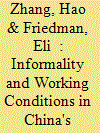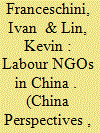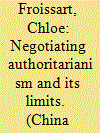|
|
|
Sort Order |
|
|
|
Items / Page
|
|
|
|
|
|
|
| Srl | Item |
| 1 |
ID:
166872


|
|
|
|
|
| Summary/Abstract |
Drawing on ethnographic data from the sanitation industry in Wenzhou and Guangzhou, we investigate different patterns of work organization in each city. We find that supplementary informal work can serve to subsidize low family income and therefore stabilize formal but exploitative work. In Wenzhou, the family team model creates time and space for one spouse to engage in informal work while still receiving a wage from the employer. This additional informal work significantly increases net family income, which neutralizes worker demands for better wages and working conditions in the formal sector. In contrast, Guangzhou workers are subject to relatively rigid spatio-temporal controls, impeding them from participating in informal work to supplement their formal wages. Despite receiving higher wages and more benefits, these workers are highly wage dependent and express much greater discontent than their equivalents in Wenzhou. Theoretically, we contribute to the literature on informality through a discussion of “ancillary informal work,” highlighting how access to certain kinds of informal work both subsidizes and is facilitated by formal sector employment.
|
|
|
|
|
|
|
|
|
|
|
|
|
|
|
|
| 2 |
ID:
166100


|
|
|
|
|
| Summary/Abstract |
Since their appearance in the mid-1990s, Chinese labour NGOs have mostly focused on three kinds of activities: establishing workers’ centres; carrying out outreach programs on labour rights; and conducting social surveys and policy advocacy. Some scholars have strongly criticised this approach, considering it excessively unbalanced towards an individualistic and narrowly legalistic view of labour rights and thus in line with the political agenda of the Party-state. Still, in the past few years, as labour conflict intensified, a handful of labour NGOs have moved forward to adopt a more militant strategy focussed on collective bargaining and direct intervention into worker collective struggles. Based on dozens of interviews with labour activists and workers and detailed analysis of two case studies of NGO-fostered collective labour mobilisation in Southern China in 2014-2015, this paper will outline the personal and political reasons that motivated these organisations to move beyond a narrow legalistic approach and turn towards collective struggles. It will also describe the strategies that Chinese labour activists have adopted in dealing with collective cases. We will conclude by examining the main challenges that labour activists in China have to face when dealing with labour unrest and by questioning the sustainability and feasibility of this new approach in the current political climate.
|
|
|
|
|
|
|
|
|
|
|
|
|
|
|
|
| 3 |
ID:
158261


|
|
|
|
|
| Summary/Abstract |
Contrary to some scholars’ assertions, worker-led collective bargaining has become a practical reality in China, especially as seen in Guangdong Province between 2011 and 2015. This article analyses the practices and strategies of negotiation to show how this is possible in a regime that recognizes neither independent trade unions nor the right to strike. Labour NGOs have become a catalyst for collective action that enables workers to change the power balance with employers, official unions and local authorities and alter their response to labour conflicts. This article thus challenges the concept of ‘bargained authoritarianism’ by stressing social actors’ ability to carve out a space for negotiating authoritarianism despite obvious limits and tightening political constraints. However, collective bargaining will remain ad hoc and localized as long as trade unions and local authorities refuse to strike a durable alliance with workers and labour NGOs.
|
|
|
|
|
|
|
|
|
|
|
|
|
|
|
|
| 4 |
ID:
086266


|
|
|
|
|
| Publication |
2009.
|
| Summary/Abstract |
The introduction of the steamships on a large scale in the late 19th century saw African and Asian sailors becoming a central component of the workforce of the British merchant marine. This development was met with considerable resistance from British seamen who saw these workers as a cheap labour force that would undermine their established position. This article interprets the steam empire as a set of overlapping webs, comprising the shipping companies, British diasporic labour and Indian Ocean seafarers. It traces how a racialized politics was generated within these webs, and the major conflicts to which this gave rise.
|
|
|
|
|
|
|
|
|
|
|
|
|
|
|
|
| 5 |
ID:
096891


|
|
|
| 6 |
ID:
168018


|
|
|
|
|
| Summary/Abstract |
This article analyses the way in which, since 2010, Chinese trade unions have been trying to find forms of authoritarian collective bargaining that allow them to advance workers’ interests without calling into question their belonging to the state apparatus. It compares the case of the Dalian Industrial Zone to that of the Shenzhen Pilot Zone in a bid to understand how the unions try to acquire effectiveness and legitimacy in the absence of any progress in terms of representation.
|
|
|
|
|
|
|
|
|
|
|
|
|
|
|
|
| 7 |
ID:
169789


|
|
|
|
|
| Summary/Abstract |
What impact is the current rise in workplace conflict having on governance in China? This article argues that, over time, protests are driving the state in two directions at once: towards greater repression and greater responsiveness. Using an original dataset of strikes, protests and riots by Chinese workers between 2003 and 2012, along with government budgetary and judicial statistics, the article demonstrates that significant, positive correlations exist at the provincial level between increased unrest on the one hand and both increased spending on the People's Armed Police (repression) and increasing numbers of pro-worker and split decisions in mediation, arbitration and court cases (responsiveness) on the other. Feedback effects exist with regard to responsiveness, though: more cases in which workers win something in turn seem to spur greater unrest. The article closes by noting the changes since Xi Jinping took office and examining the implications of the findings for China's political development.
|
|
|
|
|
|
|
|
|
|
|
|
|
|
|
|
| 8 |
ID:
092649


|
|
|
|
|
| Publication |
2009.
|
| Summary/Abstract |
Hay's argument that the 'winter of discontent' was essentially a manufactured crisis was discussed at the British Academy on the thirtieth anniversary of the 22 January 1979 public sector 'day of action'. In the edited transcript of that discussion which we publish here, three contemporary actors offer some support for, but also clear rejoinders to Hay. David Lea applauds the credit Hay gives to the efforts of the unions to make pay policy work in the late-1970s. David Lipsey argues Hay is wrong, it was a real crisis (albeit part of a battle between two very crude political narratives) and one in which the unions essentially betrayed the Labour government's attempts to sustain social democracy. Kenneth Baker also thinks the crisis was real, but he sees it as the inevitable end of Britain's postwar settlement. A number of other distinguished commentators also offer their perspective.
|
|
|
|
|
|
|
|
|
|
|
|
|
|
|
|
| 9 |
ID:
152201


|
|
|
|
|
| Summary/Abstract |
In September 2015, some 5000 women workers of the Kannan Devan Hills Plantation, a large tea estate in Munnar in Kerala, launched a spontaneous agitation demanding increased wages and bonuses. They staged a massive sit-in in Munnar town, bringing operations on the tea-estate to a halt. What was unique about this strike, which garnered considerable domestic media attention, was its non-violent nature and distancing from party-affiliated tea-plantation unions. In this paper, we use interview transcripts from a community radio program to analyze whether this strike can be seen as a precursor for a “new unionism” of the great mass of contractual, informal workers in India. We do so within the broader question of whether class identity is still relevant for informal labor in the global south. We conclude that a successful working class movement can only emerge when workers understand their roles in the long and convoluted chain of profits and are able to universalize their situations through concrete political action.
|
|
|
|
|
|
|
|
|
|
|
|
|
|
|
|
|
|
|
|
|